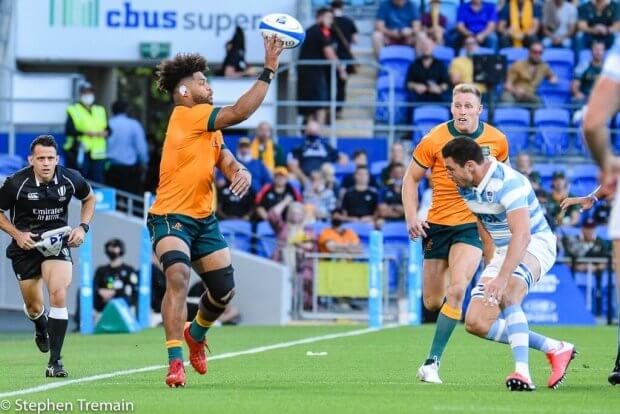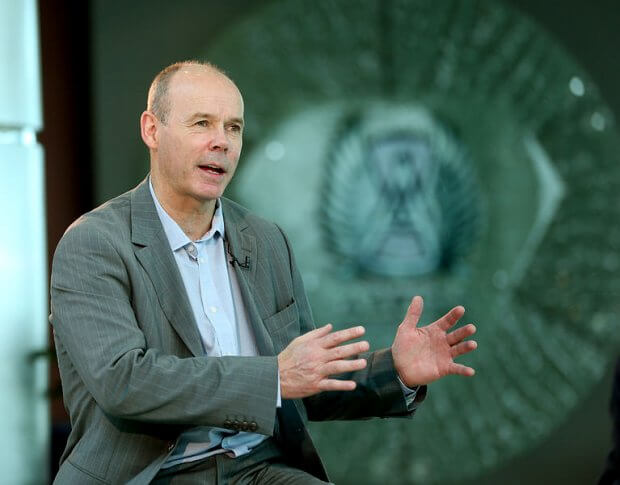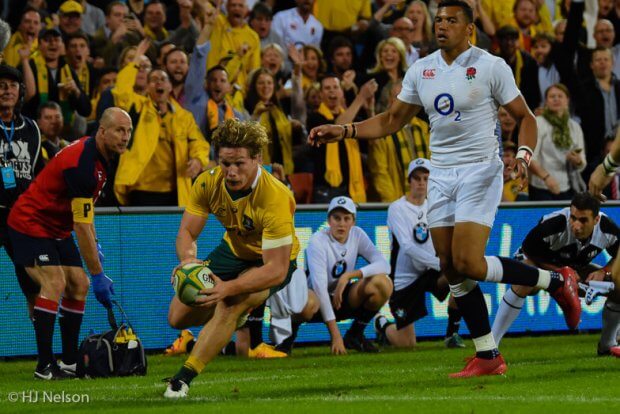It’s not Hoss today. Deal with it. Hoss has Covid and it’s a risk factor to be a heavy-drinking misanthropic fat pr!ck. Please use those same thoughts & prayers that have been so effective at stopping Seppo one-way shootouts.
Today’s news sees possible Wallaby back-row combinations, Sir Clive Woodward’s opinion on Eddie Jones and more on brain injury.
Wallaby back row

Wayne Smith of the SMH has opined on Australia’s back row options. The Reds have presented Harry Wilson with the Stan Pilecki Medal for the peer-voted best player of the season while Rob Valetini is well in line for his second successive Brett Robinson Award when the Brumbies hold their big night following the England series. It is difficult in the extreme to build a case NOT to use both Valetini and Wilson in the starting side against Eddie Jones’ men, but Wayne Smith makes that case.
Valetini has become the tip of the spear as far as the Wallabies’ attack is concerned, carrying fearlessly into the thick of the defence. Wilson, too, is a dynamic ball-runner but of a different variety. He was left home from the Wallabies’ spring tour last November to work on his footwork and did so well in that regard that he was the only forward in the top 10 for metres carried (1036m) in Super Rugby. Add to that a season in which he finished in the top 10 for tackles and offloads and his value becomes all too apparent.
But is Australia overloading too much in the one area? Rennie has been Wallabies coach for 20 Tests yet he has used Wilson for only 10 of them. Valetini, on the other hand, has been a regular, capped 18 times by Rennie and looking like becoming one of the constants in the back row alongside openside flanker and captain Michael Hooper.
Rob Leota (Rebels) is the incumbent test six, having taken advantage of Wilson’s absence on the spring tour to make his international debut. He is arguably a superior lineout jumper but his major asset is the physicality he brings to blindside flanker. With an injured Lachie Swinton forced out of the selection mix Leota could be the man to make an impression. Still, he too had an injury-affected campaign and can the Wallabies be confident of getting the same workload out of him?
The other alternative is to use Jed Holloway at six. The Waratahs veteran has demonstrated throughout his career that he is just as capable in the second row as in the loose-head role, which stamps him as an ideal reserve. Yet there is a headiness about his play, a pure rugby intelligence, which would make it very tempting for Rennie to set him free against England.
After weighing up all his options, Rennie may find himself back at the very beginning. In his first Test as Wallabies coach, in October 2020, he selected a back row of Valetini, Hooper and Wilson against the All Blacks in Wellington and deserved to get far more reward than a mere 16-all draw. Valetini was at No.8 that day and Wilson at six but a positional swap now would certainly be in order.
There is a formidable look about the Wilson-Hooper-Valetini unit. Perhaps not as menacing as Toutai Kefu, Dave Wilson and Matt Cockbain, the last back-row combination to win a World Cup for Australia. But who’s to say?
THE TESTS
July 2: First Test, 7.55pm AEST kickoff at Perth’s Optus Stadium
July 9: Second Test, 7.55pm AEST kickoff at Brisbane’s Suncorp Stadium
July 16: Third Test, 7.55pm AEST kickoff at the Sydney Cricket Ground
Clive mouths-off (no not that one)

Rugby 365 reports that World Cup-winning coach Clive Woodward has yet again ridiculed Eddie Jones following England’s defeat to Barbarians at Twickenham.
England flew out on Tuesday for their three-Test tour of Australia on the back of a 21-52 spanking by a 14-man Barbarians team that had lost “Jagged Little Will” Skelton to a first-half red card.
For quite some time now, the 2003 World Cup-winning boss has been hugely critical of Jones and his run of deflating results in recent years in charge of England. He gave Jones both barrels in March after a second successive Six Nations campaign ended with just two England wins from five matches, and he has since reloaded and fired off another round of shots on the back of what materialised at Twickenham two days before the squad’s flight from Heathrow for the start of their tour.
Woodward slammed England for allowing the tour warm-up match to become, in his opinion, a farce.
“I was disappointed with George Kruis for allowing it to happen, especially his antics around his backheel conversion. I cannot imagine Phil Bennett laughing at that,” he wrote. “It was also wrong to allow French coach Fabien Galthie and other French players to basically do anything they wanted at Twickenham. It says much about this England team. To concede 50 points against an opponent with 14 men was more than poor, but to allow the showboating said much about the team. Something had to happen and it did not.”
“Can you imagine New Zealand or South Africa letting a Barbarians team come to Auckland or Pretoria and take the mickey? But does anybody at the RFU really care – or more importantly, understand the relevance – or was this just another game, another day out, a chance to boost the finances?”
Woodward added that the time is nigh for the RFU to appoint a director of rugby above Jones to sort out the mess that England are currently enduring. “Giving Eddie Jones the keys to Twickenham is holding England back now in so many ways,” he continued. “Some of the rhetoric Jones continually comes out with is just plain daft and at this level, it doesn’t help. I saw some of his quotes about the squad for the upcoming tour of Australia and that it was a ‘good mixture of youth and experience’”.
“It should be absolutely nothing about that whatsoever. It’s about picking your best starting XV, but we have lost that under Jones. Pick your side based on the best team to represent England, nothing to do with age or experience – it really is not that difficult if you know what your best XV is. But no one knows what the best England team is and this seeps into the players’ mindset. England have gone from close to the top of the world in Japan 2019 to, at best, a workmanlike team that few currently respect. Starters, finishers, apprentices – we cannot even name a captain until we get to Australia!”
Meanwhile, aviation pioneer Nic White has talked-up Jones as a “mastermind” according to Nathan Williamson.
“But you know when they ask that question of who you’d love to have dinner with, he pops to mind straight away. I’d love to pick his brain, he’s obviously a mastermind. His name in World Rugby carries so much weight. When he talks, you should listen because he’s seen it all, had success at every level and obviously is a very good coach. He’s someone I admire really.”
“Penalising players no remedy for concussion”
Embed from Getty ImagesAccording to The Guardian’s Michael Aylwin, Rugby’s card-happy approach to concussion is just not working. Another year, another set of concussion statistics as high or higher than the last. This year’s is actually the highest recorded since the program began in 2002.
Surely at some point the penny will drop that the red-card wild-west rugby embarked upon officially on 3 January 2017, five and a half years ago, but unofficially before even that, is not working – and it never will work. To send players off and ban them for the ugliest (though far from the only) examples of contact with the head is meant to act as a deterrent, but deterrents in the wider world work only when the infringements targeted are the result of deliberate decision-making by the perpetrators in their own good time.
No rugby players these days hit opponents in the head deliberately (because they are liable to be sent off for it apart from anything else), and the time for deliberation over their acts is measured in fractions of a second. Anyone who repeats the mantra that they just need to aim lower is invariably sitting in an armchair with Twitter open. The idea is to root out upright tackling, but watch any match for five minutes and count the number of upright tacklers. They are everywhere and very often the safer option. So what we are really telling players is: “Don’t tackle upright. Apart from when you should. And if you get it wrong in that split-second you’re off.”
The key factor is what neurologists call the “cumulative dose” of energy injected into the brain. In other words, how often over a long career the players’ brains are shaken, which is constantly in a sport such as rugby union. There does not even have to be direct contact with the head. As the instrumented mouthguards used by Harlequins and others reveal, more than half the cumulative force experienced at the skull by a Premiership player comes from collisions that do not involve the head at all.
The recent changes to return-to-play timing merely chip away at the tip of an iceberg. We have to stop seeing concussions as separate from the hundreds of other times brains are shaken in a rugby match. All of them sit on the same scale, and they all count. Those deemed concussive are only the ones that trigger immediate and observable symptoms. At least they result in a break from the pummeling when the concussed player is pulled from the fray. It’s the players who do not present with symptoms we should worry about, because they carry on.
For a way out of the CTE crisis, realistically, rugby is in the hands of science. The development of some sort of therapy that might mitigate brain injury during a player’s career is the most plausible solution. Who knows? Neuroscience is on the verge of all kinds of breakthroughs. What will never mitigate brain injury, though, or even just the degree to which rugby is a laughing stock in the eyes of so many in the world, is to send innocent players from the field for incidents they have no hope of avoiding. That is not looking after them; it is betraying them. That is rugby blaming the players for the way rugby is.


